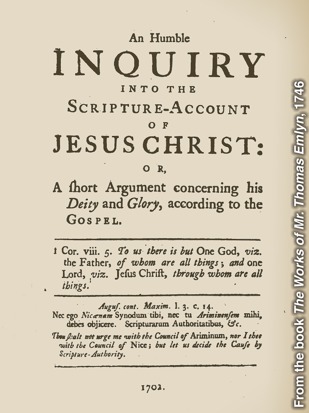Irish Legal Heritage: Blasphemy law in Ireland

Under Article 40.6.1(i) of the Constitution of Ireland, the ‘publication or utterance of blasphemous, seditious, or indecent matter is an offence which shall be punishable in accordance with law’. Pursuant to this mandate, Section 31(1) of the Defamation Act 2009 states that ‘a person who publishes or utters blasphemous matter shall be guilty of an offence and shall be liable upon conviction on indictment to a fine not exceeding €25,000.
Punishment for blasphemy originally ‘fell within the sole jurisdiction of the ecclesiastical courts’ (O’Higgins), one of the most famous trials being that of Dame Alice Kyteler and sixteen of her followers.
With the extension of the English common law system to Ireland, the trial of Thomas Emlyn in 1703 is the earliest reported case of blasphemy in the common law courts in Ireland. A Unitarian Minister, Emlyn published An Humble Inquiry into the Scripture-Account of Jesus Christ (pictured) which argued that Jesus Christ was not the equal of God. For this he was found guilty of blasphemy, and sentenced to one year’s imprisonment and a fine of £1000.
In more recent history, in the run up to the divorce referendum in 1995, several publications were flagged as potentially blasphemous in their depiction of the progressive separation of church influence from the governance of Ireland. In Corway v Independent Newspapers, the Supreme Court said that a cartoon published alongside the phrase Hello progress – bye bye Father? ‘…may indeed have been in very bad taste’ – however, absent any clear legislative definition of the offence of blasphemy, the Court would not authorise the institution of a criminal prosecution for blasphemy. While the Defamation Act 2009 provided more clarity to the definition of blasphemy, there have been no prosecutions brought under it.
There have been repeated calls for the antiquated offence of blasphemy to be removed from the Constitution, however the time and expense of a referendum, together with the fact that more pressing matters within the constitution are in need of attention, has meant that the offence remains on the books. To mitigate these concerns, the blasphemy referendum is to be held on the same day as the presidential election on 26th October 2018.
Seosamh Gráinséir









